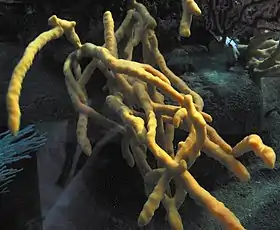Thaumarchaeota
Thaumarchaeota — тип архей з царства Proteoarchaeota. Включає 3 підтверджених види та близько 20 кандидатів (Candidatus). Представники типу є хемолітотрофами, що окислюють аміак.
? Thaumarchaeota | ||||||||
|---|---|---|---|---|---|---|---|---|
 | ||||||||
| Біологічна класифікація | ||||||||
| ||||||||
Класи | ||||||||
| ||||||||
Посилання | ||||||||
| ||||||||
Історія
Тип був виділений в 2008 році на основі філогенетичних даних, таких як послідовності генів рРНК цих організмів, а також утворення ними топоізомерази I типу, який раніше вважався унікальним для еукаріот. Ці положення були підтверджені додатковими аналізами, результати яких були опубліковані в 2010 році. У них перевірялися геноми архей Nitrosopumilus maritimus і Nitrososphaera gargensis. За результатами цих досліджень було встановлено, що ці два види відрізняються від Cenarchaeum symbiosum, який став першим описаним видом Thaumarchaeota.
Класифікація
Клас Nitrososphaeria[1]
- «Candidatus Caldiarchaeum»[2]
- «Candidatus Caldiarchaeum subterraneum»[2]
- «Candidatus Giganthauma»[3]
- «Candidatus Nitrosopelagicus»[4]
- «Candidatus Nitrosopelagicus brevis»[4]
- «Candidatus Nitrosotalea»[5]
- «Candidatus Nitrosotalea devanaterra»[5]
- ряд Cenarchaeales[6]
- ряд Nitrososphaerales[1]
- «Candidatus Nitrosopumilales»[9]
Примітки
- Stieglmeier M, Klingl A, Alves RJ, Rittmann SK, Melcher M, Leisch N, Schleper C (August 2014). Nitrososphaera viennensis gen. nov., sp. nov., an aerobic and mesophilic, ammonia-oxidizing archaeon from soil and a member of the archaeal phylum Thaumarchaeota. International Journal of Systematic and Evolutionary Microbiology 64 (Pt 8): 2738–52. PMC 4129164. PMID 24907263. doi:10.1099/ijs.0.063172-0.
- Nunoura T, Takaki Y, Kakuta J, Nishi S, Sugahara J, Kazama H, Chee GJ, Hattori M, Kanai A, Atomi H, Takai K, Takami H (April 2011). Insights into the evolution of Archaea and eukaryotic protein modifier systems revealed by the genome of a novel archaeal group. Nucleic Acids Research 39 (8): 3204–23. PMC 3082918. PMID 21169198. doi:10.1093/nar/gkq1228.
- Muller F, Brissac T, Le Bris N, Felbeck H, Gros O (August 2010). First description of giant Archaea (Thaumarchaeota) associated with putative bacterial ectosymbionts in a sulfidic marine habitat.. Environmental Microbiology 12 (8): 2371–83. PMID 21966926. doi:10.1111/j.1462-2920.2010.02309.x.
- Santoro AE, Dupont CL, Richter RA, Craig MT, Carini P, McIlvin MR, Yang Y, Orsi WD, Moran DM, Saito MA (January 2015). Genomic and proteomic characterization of "Candidatus Nitrosopelagicus brevis": an ammonia-oxidizing archaeon from the open ocean. Proceedings of the National Academy of Sciences of the United States of America 112 (4): 1173–8. Bibcode:2015PNAS..112.1173S. PMC 4313803. PMID 25587132. doi:10.1073/pnas.1416223112.
- Lehtovirta-Morley LE, Stoecker K, Vilcinskas A, Prosser JI, Nicol GW (September 2011). Cultivation of an obligate acidophilic ammonia oxidizer from a nitrifying acid soil. Proceedings of the National Academy of Sciences of the United States of America 108 (38): 15892–7. Bibcode:2011PNAS..10815892L. PMC 3179093. PMID 21896746. doi:10.1073/pnas.1107196108.
- Cavalier-Smith T (January 2002). The neomuran origin of archaebacteria, the negibacterial root of the universal tree and bacterial megaclassification. International Journal of Systematic and Evolutionary Microbiology 52 (Pt 1): 7–76. PMID 11837318. doi:10.1099/00207713-52-1-7.
- Preston CM, Wu KY, Molinski TF, DeLong EF (June 1996). A psychrophilic crenarchaeon inhabits a marine sponge: Cenarchaeum symbiosum gen. nov., sp. nov. Proceedings of the National Academy of Sciences of the United States of America 93 (13): 6241–6. Bibcode:1996PNAS...93.6241P. PMC 39006. PMID 8692799. doi:10.1073/pnas.93.13.6241.
- Zhalnina KV, Dias R, Leonard MT, Dorr de Quadros P, Camargo FA, Drew JC, Farmerie WG, Daroub SH, Triplett EW (7 July 2014). Genome sequence of Candidatus Nitrososphaera evergladensis from group I.1b enriched from Everglades soil reveals novel genomic features of the ammonia-oxidizing archaea. PLOS ONE 9 (7): e101648. Bibcode:2014PLoSO...9j1648Z. PMC 4084955. PMID 24999826. doi:10.1371/journal.pone.0101648.
- Könneke M, Bernhard AE, de la Torre JR, Walker CB, Waterbury JB, Stahl DA (September 2005). Isolation of an autotrophic ammonia-oxidizing marine archaeon. Nature 437 (7058): 543–6. Bibcode:2005Natur.437..543K. PMID 16177789. doi:10.1038/nature03911.
- Blainey PC, Mosier AC, Potanina A, Francis CA, Quake SR (February 2011). Genome of a low-salinity ammonia-oxidizing archaeon determined by single-cell and metagenomic analysis. PLOS ONE 6 (2): e16626. Bibcode:2011PLoSO...616626B. PMC 3043068. PMID 21364937. doi:10.1371/journal.pone.0016626.
- Kim BK, Jung MY, Yu DS, Park SJ, Oh TK, Rhee SK, Kim JF (October 2011). Genome sequence of an ammonia-oxidizing soil archaeon, "Candidatus Nitrosoarchaeum koreensis" MY1. Journal of Bacteriology 193 (19): 5539–40. PMC 3187385. PMID 21914867. doi:10.1128/JB.05717-11.
- Lebedeva EV, Hatzenpichler R, Pelletier E, Schuster N, Hauzmayer S, Bulaev A, Grigor'eva NV, Galushko A, Schmid M, Palatinszky M, Le Paslier D, Daims H, Wagner M (2013). Enrichment and genome sequence of the group I.1a ammonia-oxidizing Archaeon "Ca. Nitrosotenuis uzonensis" representing a clade globally distributed in thermal habitats. PLOS ONE 8 (11): e80835. Bibcode:2013PLoSO...880835L. PMC 3835317. PMID 24278328. doi:10.1371/journal.pone.0080835.
- Li Y, Ding K, Wen X, Zhang B, Shen B, Yang Y (March 2016). A novel ammonia-oxidizing archaeon from wastewater treatment plant: Its enrichment, physiological and genomic characteristics. Scientific Reports 6: 23747. Bibcode:2016NatSR...623747L. PMC 4814877. PMID 27030530. doi:10.1038/srep23747.
- Park SJ, Kim JG, Jung MY, Kim SJ, Cha IT, Kwon K, Lee JH, Rhee SK (December 2012). Draft genome sequence of an ammonia-oxidizing archaeon, "Candidatus Nitrosopumilus koreensis" AR1, from marine sediment. Journal of Bacteriology 194 (24): 6940–1. PMC 3510587. PMID 23209206. doi:10.1128/JB.01857-12.
- Mosier AC, Allen EE, Kim M, Ferriera S, Francis CA (April 2012). Genome sequence of "Candidatus Nitrosopumilus salaria" BD31, an ammonia-oxidizing archaeon from the San Francisco Bay estuary. Journal of Bacteriology 194 (8): 2121–2. PMC 3318490. PMID 22461555. doi:10.1128/JB.00013-12.
- Bayer B, Vojvoda J, Offre P, Alves RJ, Elisabeth NH, Garcia JA, Volland JM, Srivastava A, Schleper C, Herndl GJ (May 2016). Physiological and genomic characterization of two novel marine thaumarchaeal strains indicates niche differentiation. The ISME Journal 10 (5): 1051–63. PMC 4839502. PMID 26528837. doi:10.1038/ismej.2015.200.
This article is issued from Wikipedia. The text is licensed under Creative Commons - Attribution - Sharealike. Additional terms may apply for the media files.